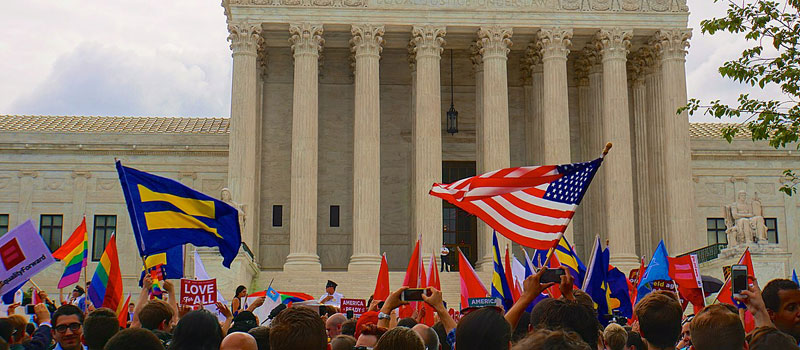Why same sex marriage should not be taken for granted
August 2022
 By Simon Williams
By Simon Williams
You might have heard a lot of noise coming from the US about the threat to same sex marriage.
This is because of the reversal of a famous US abortion court case known as Roe v Wade: a court case which had protected a woman’s right to an abortion within certain limits since 1973. The fear is that the top US court will move against a similar judge-made law protecting same sex marriage, based on similar judicial reasoning. As we said in June, sometimes what happens in the US often crosses the Atlantic.
So what’s going on? Just as in the UK, some key rights in the US system of law are based on court or judge-made decisions and not on legislation passed by the US Congress or UK Parliament.
In reversing Roe and with an expanded conservative majority of judges, the court said that the right to privacy for a woman to have an abortion is not protected by the US Constitution, so striking down almost half a century of settled law.
Whatever one thinks of the court’s decision on abortion, the fear is that the next step for the court will be to unpick similar judge-made protections covering a range of privacy rights from the right for a woman to access contraception to same sex sexual activity and most notably for same sex marriage. It is possible that LGBTQ+ people in the US are next in the conservative court’s cross hairs.
As explained in our June update, one conservative judge, Justice Clarence Thomas, explicitly namechecked the landmark case of Obergefell v Hodges, a Supreme Court decision in 2015 which opened the right for people of the same sex to enter into civil marriage across the United States regardless of the law of the state in which they lived.
Some conservative Supreme Court judges rejected the idea that reversing Roe would endanger privacy protections such as same sex marriage. But there’s a gamble whether or not to trust them. In any case, with the overturning of Roe, and with a newly expanded conservative majority on the court, these judge-made protections look more and more fragile; the new language of the court majority appears to be moving against what they would term “judicial activism” – the court’s conservative judges say legal protections should be left to the US Congress and /or the laws of the fifty US states.
Given the fallout from Roe, the political response to protect same sex marriage at a federal level was understandably rapid. Last week, the Democratic-controlled US House of Representatives passed the Respect for Marriage Act with around a quarter of Republican members of the House also supporting the bill.
The bill needs to go to the powerful Senate to be made law; if passed, it would offer some protection for recognising same sex marriage and make it harder to challenge established same sex marriages.
However, there’s still some questions as to how this legislation will work, especially given the shift against constitutional ‘privacy’ rights taken by the US Supreme Court.
It is unclear how sympathetic the court may be to the rights of, say, marriage registration officials who refuse to undertake same sex marriage registration if it is against their faith or for other reasons of conscience. Which rights win?
What happens in America may affect us here. We'll keep you updated as things progress.
See our article: US abortion & LGBTQ+ rights




